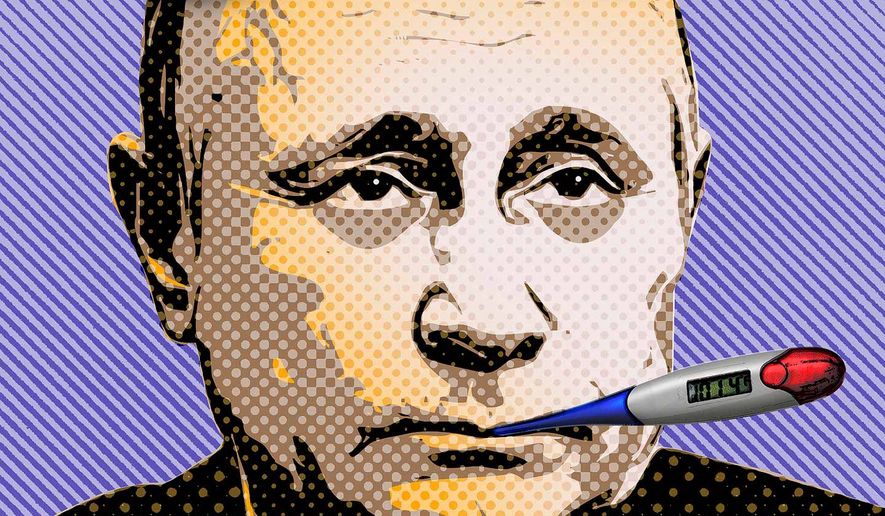OPINION:
Many of the world’s political leaders and even some business leaders who should know better seem to have forgotten “stage two.” When studying economics, students are supposed to learn to look at the consequences of any action — stage two.
A major reason that Ronald Reagan’s presidency was so successful was that Mr. Reagan was the last president to have a degree in economics and a good understanding of the subject and was smart enough to surround himself and populate his administration with world-class economists. They took the mess that former President Jimmy Carter had left them in four years and turned the U.S. economy into the world’s wonder.
The Russian ruble, after collapsing with the imposition of the sanctions, now appears to have regained much of its value as the market realized that Russian President Vladimir Putin is still selling massive quantities of oil and gas and has demanded that the buyers pay for it in rubles or gold. President Biden has been saying the rise in U.S. gasoline prices is due to Mr. Putin, but if the Russians are still selling their oil and gas on the world market, why is the price so high?
Why sanctions? The goal for much of the world, including the U.S. and Europe, is to stop the Russian war against Ukraine, where thousands of innocent women and children are being slaughtered by the Russian military. Rather than put the U.S. and other NATO troops in Ukraine directly in the fight, the idea has been to impose economic sanctions to bring Mr. Putin to heel.
Sanctions often impose real costs on the citizens in the country subject to them, but they rarely prevent the sanctioned country from obtaining the goods and services it really needs, as long as some countries do not go along with the sanctions. Perhaps the best example of sanctions really working was decades ago when virtually the entire world agreed that apartheid in South Africa had to end. South Africa was quickly brought to its knees, and the loathsome policy was abolished. U.S. sanctions have not brought down the regime in Cuba, for instance, because the Cubans can obtain virtually everything they need from Europe and the Asian and many Latin American nations. Mr. Putin can sell the Russian oil and other natural resources — perhaps at a discount — to China, India and other nations who have not agreed to impose the sanctions.
Most internationally traded commodities are priced and sold in U.S. dollars, but as long as the seller is willing to take some other currency or gold — or even bitcoin — they can still sell. The dollar is the world’s reserve currency and is of great benefit to the U.S. in the sense that the U.S., in effect, obtains near interest-free loans from the rest of the world, much of which will never be called.
The Chinese, the Russians and many others, including even the Swiss, have chafed under what they believe to be the global dollar tyranny, of which they have been seeking to free themselves. The sanctions are forcing the Russians to develop alternatives to the dollar much more rapidly — which is not in the long-term interest of the U.S.
Even Gita Gopinath, the first deputy managing director of the IMF, has warned that the sanctions may result in a more fragmented international monetary system. The U.S. share of foreign reserves has fallen from about 70% a decade ago to about 60%. The trend is likely to continue.
The sanctions impose real costs on the Russian people, making it much more difficult for them to buy from or sell to foreigners since they can no longer use the global dollar-based trading and clearing system. Also, they are being deprived of desired goods and services like the Big Mac. The problem is that the target of the sanctions is Mr. Putin, not the Russian people. Last week, when Mr. Biden said (quite correctly) that the goal is to get rid of Mr. Putin, he spoke the truth that the foreign policy establishment did not want him to say.
The real goal is regime change in Russia to stop the war. There is little chance that Russians can vote out or revolt against Mr. Putin at this time. Western policy should evaluate how to get rid of Mr. Putin faster by effectively exploiting the conflict between Mr. Putin and his generals (on war campaign failures) and by putting more pressure on oligarchs around Mr. Putin. They are losing vast amounts of wealth and power and cannot be happy with their current affairs. Ideally, some would find a way to put Mr. Putin into involuntary retirement.
Mr. Putin is in a box of his own making in that he can no longer walk away as leader of Russia — too many enemies and too much blood on his hands. (How long would he last in a nice condo in Miami Beach as just another retiree?) Most dictators do not come to happy ends — because too few can envision and hence do not plan for a “stage two” where they are no longer in charge. Perhaps the London political and sports betting markets could open a book on Mr. Putin’s life expectancy.
• Richard W. Rahn is chairman of the Institute for Global Economic Growth and MCon LLC.




Please read our comment policy before commenting.